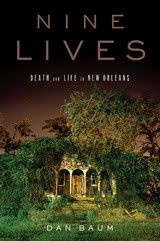 I recently finished reading Dan Baum‘s remarkable book, Nine Lives: Death and Life in New Orleans. Published this past March (right around Mardi Gras), in alternating, rigidly chronological chunks, the book follows a diverse group of New Orleanians and their disparate paths through Hurricane Katrina. Sound familiar? Yeah, on the surface, the premise is similar to A.D.‘s, but Nine Lives is much more than a Katrina book.
I recently finished reading Dan Baum‘s remarkable book, Nine Lives: Death and Life in New Orleans. Published this past March (right around Mardi Gras), in alternating, rigidly chronological chunks, the book follows a diverse group of New Orleanians and their disparate paths through Hurricane Katrina. Sound familiar? Yeah, on the surface, the premise is similar to A.D.‘s, but Nine Lives is much more than a Katrina book.
In my career as a cartoonist I’ve come to treasure the many things that comics can do to bring a fullness to storytelling, that unique combination of words and pictures which bring a tale to life. When I took on A.D. I really felt that comics was a groundbreaking way to explore the Katrina story in a way that the magazine stories, photographs, news footage, and even documentaries could not. Fortunately, many have agreed, and in fact no less than Baum himself recently wrote about A.D. that “Who’d have thought that after watching all that video we’d come upon a fresh visual way to experience Hurricane Katrina? Josh Neufeld’s drawings — and his tender, dead-honest dialogue — brought it all back in a way that made me feel it in my gut."
Anyway, it’s my turn to repay the compliment. Baum, who was a New Yorker staff writer sent to cover New Orleans when Katrina hit (and who a few months ago posted a notorious post-mortem of his New Yorker career on Twitter), has talked about how he soon realized that "Katrina was not the most interesting thing about New Orleans, not by a long shot." No, rather it is the city itself — its history, its people, its communities, its soul — that made it so compelling. And by writing about his subjects in such a fully realized way, Baum really proves that point.
Nine Lives picks up the stories of its characters in 1965, right after Hurricane Betsy ravaged New Orleans, and takes us through the next forty years — and Katrina. With incredible skill and imagination, Baum evokes each of his subjects’ circumstances. Whether they’re the quirky county coroner, the Mardi Gras indian, the Ninth Ward union leader, the transsexual bar owner, the cynical white cop, or any of the book’s other wonderful subjects, Baum gets into each of their heads in an amazing way. He does this through novelistic techniques unusual for a nonfiction book.
And Nine Lives uses one distinct advantage of prose, the ability to really delve deeply and thoroughly into a topic. It’s a profound trip through these characters’ lives, as they grow from young men and women, succeed and fail, fall in and out of love, have children of their own, and grow old. The result is an amazing 40-year journey which brings real context to the tragedy of Hurricane Katrina, and reminds us what a complex, contradictory, bizarre, infuriating, lovable, alien, and yes, unique, city, New Orleans was — and is. Nine Lives refuses to let tragedy be the final note. As Baum notes, his writing mandate for Nine Lives was "all happy endings. All nine of these people are, in their own way, heroes. And while [I] could have ended any of their stories on a down note, [I] instead end all at a moment of ascendance."
Thanks to Dan Baum and Nine Lives, we all have reason to hope the real story of New Orleans ends happily too.
